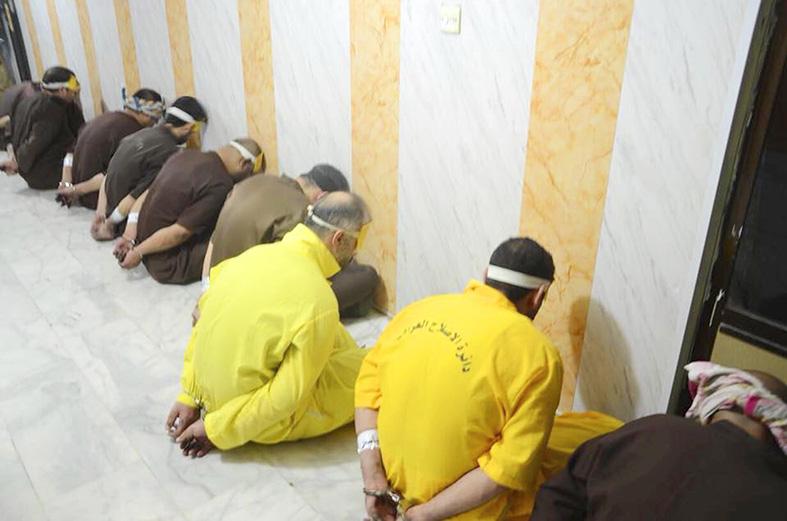Apart from China and despite a worldwide drop in death sentences, countries in the Middle East remained among the world’s leading executioners last year, Amnesty International said yesterday.
The number of executions worldwide plummeted to its lowest level in more than a decade, with at least 483 people executed last year, compared with 657 in 2019, as the COVID-19 pandemic slowed criminal trials and disrupted scheduled executions.
Four states in the region — Iran, Egypt, Iraq and Saudi Arabia — topped the global list and pressed on with shootings, beheadings and hangings, ignoring pleas by rights groups to halt executions during the pandemic, the report said.

Photo: Iraqi Ministry of Justice via AP
Although counts in the nations fell in line with global trends, largely due to Saudi Arabian legal reforms, the countries carried out 88 percent of the world’s total known executions last year, said the London-based rights group, which campaigns for abolition of the death penalty.
The numbers show that the region is “truly out of sync with the rest of the world,” said Heba Morayef, Amnesty’s director for the Middle East and North Africa. “The Middle East stands out as a region that clings to the use of the death penalty after deeply unfair trials.”
Egypt executed more than three times as many condemned prisoners last year than it did the year before, overtaking Saudi Arabia as the world’s third-most prodigious executioner, the report said.
Although Iraq more than halved the number of people it put to death last year compared with 2019, primarily because of virus-induced court closures, the government faces international criticism for carrying out mass executions.
Iraqi courts have grappled with thousands of detainees suspected of being Islamic State group fighters or supporters, following the group’s defeat on the battlefield in 2017.
On a single day in November last year, 21 prisoners held on terrorism-related charges were hanged.
The region’s 25 percent decline in executions was driven by Saudi Arabia, long one of the world’s most prolific executioners.
In a dramatic shift, the Saudi government scaled back its executions last year by 85 percent.
The kingdom attributed the drop to legal reforms promoted by the country’s de facto ruler, Crown Prince Mohammad bin Salman. New directives halted executions for drug offenses and abolished the death penalty for minors.
Amnesty’s annual country-to-country figures exclude China, where figures, believed to be in the thousands, are classified as a state secret.
The report also omits executions from some countries marred by conflict, such as Syria, which Morayef called “one of the big black boxes.”

LANDMARK CASE: ‘Every night we were dragged to US soldiers and sexually abused. Every week we were forced to undergo venereal disease tests,’ a victim said More than 100 South Korean women who were forced to work as prostitutes for US soldiers stationed in the country have filed a landmark lawsuit accusing Washington of abuse, their lawyers said yesterday. Historians and activists say tens of thousands of South Korean women worked for state-sanctioned brothels from the 1950s to 1980s, serving US troops stationed in country to protect the South from North Korea. In 2022, South Korea’s top court ruled that the government had illegally “established, managed and operated” such brothels for the US military, ordering it to pay about 120 plaintiffs compensation. Last week, 117 victims

China on Monday announced its first ever sanctions against an individual Japanese lawmaker, targeting China-born Hei Seki for “spreading fallacies” on issues such as Taiwan, Hong Kong and disputed islands, prompting a protest from Tokyo. Beijing has an ongoing spat with Tokyo over islands in the East China Sea claimed by both countries, and considers foreign criticism on sensitive political topics to be acts of interference. Seki, a naturalised Japanese citizen, “spread false information, colluded with Japanese anti-China forces, and wantonly attacked and smeared China”, foreign ministry spokesman Lin Jian told reporters on Monday. “For his own selfish interests, (Seki)

Argentine President Javier Milei on Sunday vowed to “accelerate” his libertarian reforms after a crushing defeat in Buenos Aires provincial elections. The 54-year-old economist has slashed public spending, dismissed tens of thousands of public employees and led a major deregulation drive since taking office in December 2023. He acknowledged his party’s “clear defeat” by the center-left Peronist movement in the elections to the legislature of Buenos Aires province, the country’s economic powerhouse. A deflated-sounding Milei admitted to unspecified “mistakes” which he vowed to “correct,” but said he would not be swayed “one millimeter” from his reform agenda. “We will deepen and accelerate it,” he

Japan yesterday heralded the coming-of-age of Japanese Prince Hisahito with an elaborate ceremony at the Imperial Palace, where a succession crisis is brewing. The nephew of Japanese Emperor Naruhito, Hisahito received a black silk-and-lacquer crown at the ceremony, which marks the beginning of his royal adult life. “Thank you very much for bestowing the crown today at the coming-of-age ceremony,” Hisahito said. “I will fulfill my duties, being aware of my responsibilities as an adult member of the imperial family.” Although the emperor has a daughter — Princess Aiko — the 23-year-old has been sidelined by the royal family’s male-only